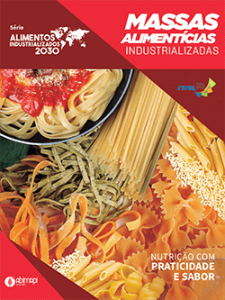CONSUMPTION TRENDS FOR INDUSTRIALIZED DOUGHS
In Brazil, the bakery industry is well-developed and markets products suitable to the consumer market trend, a fact highlighted in the study Brasil Bakery & Confectionery Trends 2020 (www.bakeryconfectionerytrends.com.br). This study identified five consumption macrotrends that explain well the behavior of the doughs demand: Nutrition and Functionality (products with more proteins, fibers, whole flours, addition of ancestor grains, seeds, and vegetables), Control and Adequacy (products with lower calories, carbohydrates, fats, sodium and gluten), Naturalness and Authenticity (products with less ingredients, without preservatives, natural ingredients, etc.), Sustainability and Transparency (organic products, with ingredients produced with sustainability, etc.) and Premium products and Experience (gourmet, premium, artisanal, sophisticated products, etc.).
NUTRITION and FUNCTIONALITY
Valuation of products with more proteins, fibers, whole flout, with addition of ancestor grains, seeds, and vegetables.
 Dated back to its origin, doughs perform a fundamental role in the mankind feeding and nutrition, being highlighted by its basic content of carbohydrates balances with significant content of proteins and fibers. In the last decades, especially in developed countries, the dough market has been stimulated by the greater demand for whole grain and protein-fortified products, among others aligned with this macrotrend. Brazilian market has also launched new products with these characteristics.
Dated back to its origin, doughs perform a fundamental role in the mankind feeding and nutrition, being highlighted by its basic content of carbohydrates balances with significant content of proteins and fibers. In the last decades, especially in developed countries, the dough market has been stimulated by the greater demand for whole grain and protein-fortified products, among others aligned with this macrotrend. Brazilian market has also launched new products with these characteristics.
CONTROL an ADEQUACY
Valuation of products with lower calories, carbohydrates, fats, sodium and gluten.
 In addition to the higher interest on the suitable nutrients intake, the CONTROL and ADEQUACY macrotrend is characterized by the concern that many consumers are trying to balance their dally meals, seeking to control the consumption of food with high content of salt, fats, calories, and even gluten, even though the latest is mainly directed to this component in the wheat flour. Globally, it has driven the increase the offering for products with a reduced content of fat, less quantities of sodium and doughs with rice flour and other gluten-free ingredients, the same has been happening in the Brazilian market.
In addition to the higher interest on the suitable nutrients intake, the CONTROL and ADEQUACY macrotrend is characterized by the concern that many consumers are trying to balance their dally meals, seeking to control the consumption of food with high content of salt, fats, calories, and even gluten, even though the latest is mainly directed to this component in the wheat flour. Globally, it has driven the increase the offering for products with a reduced content of fat, less quantities of sodium and doughs with rice flour and other gluten-free ingredients, the same has been happening in the Brazilian market.
In addition to the new launchings and reformulation of traditional product, voluntarily made by the companies, there are agreements signed by companies with the Ministry of Health, with goals for reduction of fat and sodium in industrialized products.
NATURALNESS and AUTHENTICITY
Valuation of products with less ingredients, with no preservatives, natural ingredients, etc.
 Associated to the consumers preference for comfort food and health, the NATURALNESS and AUTHENTICITY macrotrend indicates the valuation for products seen as artisanal, natural, without artificial additives. Despite the traditional items containing additives are considered as safe, industries have developed products with more simplified formulas, with ingredients in smaller numbers and more familiar to the consumers.
Associated to the consumers preference for comfort food and health, the NATURALNESS and AUTHENTICITY macrotrend indicates the valuation for products seen as artisanal, natural, without artificial additives. Despite the traditional items containing additives are considered as safe, industries have developed products with more simplified formulas, with ingredients in smaller numbers and more familiar to the consumers.
Among the trends supported by many experts on the occasion of the World Pasta Day 2019, the valuation of simplicity by consumers and basic dressings with few ingredients was highlighted.
The The Hartman Group company report highlighted that the authenticity will be a key factor for the dough market, as it carries important significance from the consumers’ point of view, such as higher quality, naturalness (clean label), regionalism, among others.
SUSTAINABILITY and TRANSPARENCY
Valuation of organic products, with ingredients made in a sustainable manner, etc.
 The SUSTAINABILITY and TRANSPARENCY macrotrend represents the valuation of the way industrialized food is made and also the importance attributed to the manufacturers social and environmental responsibility. It has promoted the increase in the demand for organic products and with environmental certifications.
The SUSTAINABILITY and TRANSPARENCY macrotrend represents the valuation of the way industrialized food is made and also the importance attributed to the manufacturers social and environmental responsibility. It has promoted the increase in the demand for organic products and with environmental certifications.
On the other hand, consumers want clear information about the ingredients used and the types of processes used in the manufacturing.
Among the trends pointed out by the World Pasta Day 2019, it was highlighted the ethical and sustainable consumption that privileges doughs with vegetables (plant-based), organic and with lower impact to the health and environment. Also at the World Pasta Day 2020, ethical consumption was among the main market trend, having the experts in the sector evaluation that, in the future, doughs shall highlight for its adequacy to plant-based, organic recipes and by the use of ingredients from responsible and sustainable origin.
PREMIUM PRODUCTS and EXPERIENCE
Valuation of gourmet, premium, artisanal, sophisticated products, etc.
 The PREMIUM PRODUCTS and EXPERIENCE macrotrend determines the market growth for products with enhanced quality and for the sensory appeals. In this group, there are those with claims for premium quality, gourmet and products with claims for conscious comfort products, that is with the previous characteristics, but with less calories, natural and sustainable ingredients. In short, with the attributes of the other macrotrends of the sector.
The PREMIUM PRODUCTS and EXPERIENCE macrotrend determines the market growth for products with enhanced quality and for the sensory appeals. In this group, there are those with claims for premium quality, gourmet and products with claims for conscious comfort products, that is with the previous characteristics, but with less calories, natural and sustainable ingredients. In short, with the attributes of the other macrotrends of the sector.
In 2017, a research conducted by FIESP/CIESP identified lasagna and spaghetti among the three dished preferred by Brazilians, followed by rice and beans, that continue being the preference of almost one-third of the population.
In 2017, the The Hartman Group report highlighted freshness, authenticity and novelty as being the three fundamental characteristics for doughs to be identified by consumers as having a higher quality (premium). In the Brazilian market, the search for fresh, higher quality products has stimulated the launching of refrigerated doughs with a gourmet appeal.




